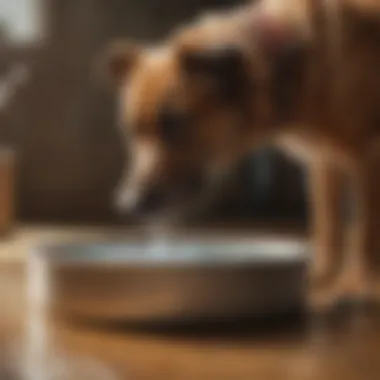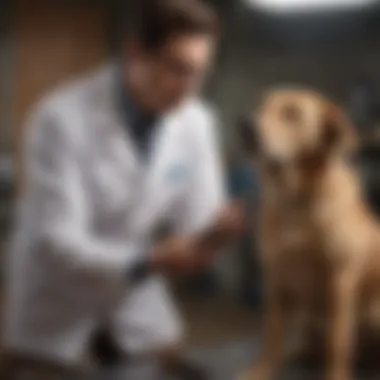What to Give a Dog with Diarrhea: Nutritional Guidance


Intro
Diarrhea in dogs can be a common yet distressing condition. Understanding how to care for your pet during this troubling time is crucial. Diarrhea may stem from various causes, ranging from dietary indiscretion to more serious health issues. This article seeks to provide insights into the appropriate nutritional needs and management strategies to support your dog's recovery.
Understanding Your Pet
Recognizing your pet's specific traits can help guide you in managing their health effectively.
Breed Traits
Different breeds may have tendencies toward various health issues, including gastrointestinal problems. For instance, some toy breeds might be more prone to digestive upset due to their small stomachs.
Common Temperaments
Each dog has its own temperament, which can affect how they respond to illness. An anxious dog might exhibit more severe symptoms when faced with diarrhea. Knowing your dog's usual behavior can help you identify changes that might require attention.
Special Needs
Some dogs may have special dietary or health needs that must be taken into account. Older dogs, those with existing health conditions, or certain breeds may require specific care during episodes of diarrhea.
Pet Care Essentials
To effectively manage your dog's diarrhea, focus on their nutrition and overall wellness.
Nutrition and Feeding Guidelines
When a dog has diarrhea, it is often necessary to adjust their diet temporarily. Consider providing easily digestible foods such as boiled chicken and rice. It's important to avoid fatty foods or seasoned preparations. Gradually reintroduce their regular diet after a few days of improvement.
Grooming Tips and Techniques
Keeping your pet clean is vital during this time. Ensure that their anal area is clean to prevent irritation. A wet cloth can be effective for cleaning.
Health and Wellness
Regular veterinary check-ups are essential. When a dog experiences diarrhea, monitor their hydration levels closely. Make sure they have access to clean water. Adding an electrolyte solution recommended by a veterinarian can also be beneficial.
Training and Behavior
Understanding behavioral responses can help you provide better care.
Basic Training Techniques
Use positive reinforcement to encourage good behavior, especially while your pet is feeling unwell. Avoid harsh disciplinae, as this may cause additional stress.
Behavioral Problems and Solutions
A dog with diarrhea may become more withdrawn or anxious. Be patient, and provide comfort as they recover.
Mental Stimulation Activities
Engage your pet with low-energy mental stimulation activities. Puzzles or gentle games can help distract them without exhausting their energy.
Engaging with Your Pet
Keeping your pet engaged through this time can help their overall mood and recovery.
Interactive Games and Toys
Using soft and gentle toys can provide safe interaction while your dog is uncomfortable.
Safe Outdoor Activities
Limit outdoor time until your dog is back to normal. Short, leisurely strolls can be beneficial without causing strain.
Family-Friendly Pet Interactions


Ensuring your pet feels loved and included during this time can assist their emotional well-being.
Pet Adoption and Integration
Understanding how to bring a new pet into your home is crucial, especially when they might face health issues.
Choosing the Right Pet for Your Lifestyle
Select a breed that suits your energy levels and lifestyle. This will aid in managing their health needs in the long run.
Preparing Your Home for a New Pet
Create a comfortable space that is quiet and safe for your new pet. Consider any special needs they might have.
Tips for Smooth Preamble
When integrating a new pet, take time to gradually introduce them to your home and family. This can help ease any stress during transitions.
By understanding your dog's needs and providing the appropriate care, you can help them recover from diarrhea effectively. Always consult with a veterinarian for guidance if symptoms persist.
Understanding Diarrhea in Dogs
Diarrhea in dogs represents more than just an inconvenience; it is a critical symptom that can signify deeper health issues. Understanding this condition is vital for any pet owner who wishes to ensure their dog's health and well-being. By grasping the underlying causes, observing symptoms, and recognizing when to seek help, owners can make informed decisions that can lead to effective treatment and recovery for their furry companions.
Causes of Diarrhea
The causes of diarrhea in dogs can range from mild to severe. Common factors include:
- Dietary indiscretion: This often occurs when a dog consumes something they shouldn't, such as spoiled food or foreign objects.
- Infections: Bacterial, viral, or parasitic infections can disrupt a dog’s digestive system, leading to diarrhea.
- Food allergies or intolerances: Some dogs may react negatively to specific ingredients in their diet.
- Medications: Certain medications can cause gastrointestinal disturbances as a side effect.
- Underlying health conditions: Issues like pancreatitis, liver disease, or inflammatory bowel disease can lead to chronic diarrhea.
Recognizing these causes helps in resolving the issue effectively and returning your dog to a healthy state.
Symptoms to Observe
When a dog is experiencing diarrhea, there are several symptoms to closely monitor:
- Frequency of bowel movements: Increased defecation may indicate a problem.
- Consistency of stool: Watery or mushy stools are classic signs of diarrhea.
- Presence of blood or mucus: This can signal serious health issues that require immediate attention.
- Vomiting: If your dog is also vomiting, it may elevate concerns regarding their health.
- Lethargy: A noticeable decrease in energy levels could indicate a serious underlying condition.
Keeping track of these symptoms assists owners in determining the severity of the situation and the need for veterinary intervention.
When to Be Concerned
It is essential for dog owners to recognize when diarrhea escalates from a manageable issue to a situation that requires veterinary assistance. Indicators that should prompt immediate concern include:
- Persistent diarrhea lasting more than 24 hours.
- Severe dehydration: Signs include dry gums, excessive thirst, or lethargy.
- Abdominal pain: Indicated by whining or excessive panting.
- Accompanying symptoms: Like fever, vomiting, or blood in stool.
- Sudden changes in behavior or appetite: This may reflect more serious health concerns.
In such cases, contacting a veterinarian is not only wise but crucial for the dog's recovery and health. Understanding these key elements positions dog owners to take decisive actions that can lead to favorable outcomes.
Initial Steps to Take
When a dog experiences diarrhea, the initial steps taken by a pet owner are critical. Understanding how to manage this condition can significantly influence recovery. Immediate response focuses on two key areas: assessing hydration levels and deciding whether to withhold food. Both factors are essential in preventing further complications and ensuring proper care for your pet.
Assessing Hydration Levels
Diarrhea often leads to loss of fluids and electrolytes, making hydration assessment a priority. Signs of dehydration in dogs can be subtle yet serious. Look for dry gums, sunken eyes, or skin that doesn't return to normal quickly when pinched. You can perform a simple test by gently pulling the skin on the back of the dog's neck. If it does not spring back, this indicates dehydration.
To address this, provide fresh water in a clean bowl. Encourage your pet to drink by adding some low-sodium broth to the water or, in some cases, using a syringe (without the needle) to administer fluids directly. Consider the following:
- Make sure the water is easily accessible
- Offer smaller amounts more frequently if the dog seems reluctant
- Monitor the quantity of water consumed to ensure adequate intake
Tips to Assess Hydration:
- Check the moisture level of the nose.
- Observe the dog's behavior; lethargy can be a sign.
- Keep an eye on urine output; decreased urination can indicate dehydration.
Important Note: If you suspect severe dehydration, it is advisable to seek veterinary care immediately.


Withholding Food
When dealing with diarrhea, withholding food for a short period can help the gastrointestinal tract to recover. This means giving your dog's digestive system a chance to rest and heal. However, it isn’t simply a matter of not feeding your pet. You should consider the duration carefully. Most veterinarians recommend withholding food for about 12 to 24 hours, depending on the dog's size and age.
During this period, provide ample water to keep up hydration. If the diarrhea persists beyond a day or two or if the dog shows signs of distress, then re-evaluation is necessary. When you decide to reintroduce food, start with bland options rather than usual meals.
Factors to Consider When Withholding Food:
- Age of the dog: Puppies may need food more frequently.
- General health condition: An ill pet may require food sooner.
- Behavioral changes: Monitor if the pet appears more uncomfortable or not themselves.
In summary, effective initial steps such as assessing hydration levels and deciding appropriately on withholding food are crucial when handling a dog with diarrhea. These measures not only mitigate immediate health risks but also help set the stage for recovery.
Dietary Recommendations
Dietary recommendations play a crucial role in managing diarrhea in dogs. The right dietary approach can help to minimize the symptoms and speed up recovery. By selecting suitable food options, pet owners can provide their dogs with nutrients while reducing gastrointestinal stress. It is important to consider the digestibility of foods and their potential impact on a dog's overall health during this challenging time.
Bland Diet Options
Rice and Boiled Chicken
Rice and boiled chicken is a staple recommendation for dogs experiencing diarrhea. The primary aspect that makes this dish favorable is its simplicity and digestibility. Boiled chicken provides a good source of protein while cooked rice acts as a binding agent, which can help firm the stool. The bland nature of this meal means it is less likely to irritate the digestive system, making it a popular choice for many pet owners.
One unique feature of rice and boiled chicken is that it is easy to prepare. Pet owners can quickly whip up this meal without complicated ingredients. However, it is important to ensure that the chicken is unseasoned and free from skin or bones, as these can lead to further complications. It can be a beneficial option, but it lacks some vitamins and minerals, so it should not be used as a long-term diet.
Pumpkin
Pumpkin is often suggested for dogs with diarrhea due to its high fiber content. This fiber aids in regulating bowel movements, providing a natural solution for digestive issues. The key characteristic of pumpkin is its ability to absorb excess water in the intestines, which can help firm up loose stools.
This ingredient’s unique feature lies in its versatility as it can be easily added to any meal. Furthermore, canned pumpkin (not the spiced pie filling) is an easy way to incorporate it into a dog's diet. While pumpkin is generally safe, moderation is necessary, as excessive fiber can also lead to additional digestive discomfort.
Sweet Potatoes
Sweet potatoes are another excellent option for a bland diet. They are packed with carbohydrates and are gentle on the stomach, making them a reliable choice for dogs dealing with diarrhea. The key aspect of sweet potatoes is their natural sweetness, which many dogs find appealing, encouraging them to eat despite feeling unwell.
The unique feature of sweet potatoes is their high nutritional content. They provide vitamins A, C, and B6, along with an array of beneficial antioxidants. However, like pumpkin, they should be offered in moderation. Too much fiber can result in diarrhea rather than curing it. Knowing the right amount to give contributes to successful management of digestive issues.
Commercial Diets
Veterinary Formulated Foods
Veterinary formulated foods are designed specifically for dogs experiencing gastrointestinal issues. These diets have a balanced mix of nutrients that support recovery while being easy to digest. The main characteristic of these foods is their composition, which often includes low-fat protein and digestible carbohydrates. This makes them suitable for dogs with sensitive stomachs.
The unique feature here is that veterinarians formulate these diets based on ongoing research and understanding of animal nutrition. They are tailored not just for diarrhea, but for broader digestion issues as well. However, they can be more expensive than regular dog food, which might be a limiting factor for some pet owners.
Easily Digestible Options
Easily digestible options are commercial products that are often gentle on the dog's stomach. These diets are made with ingredients that improve the breakdown of nutrients. The key characteristic of easily digestible options is that they typically contain limited ingredients, focusing on single-source proteins and simple carbohydrates.
One unique feature of these diets is that they can often be found in both dry and wet forms, allowing for versatility in presentation. They may also include added probiotics to support gut health. But, pet owners should always ensure that the selected food is appropriate for their dog's specific needs, as some may still experience sensitivity to certain ingredients.
The Role of Probiotics
Probiotics serve an important function in restoring gut health and balance. By introducing beneficial bacteria into a dog's digestive system, probiotics can help combat microbial imbalances often present during diarrhea episodes. They can ease symptoms and promote overall digestive health. However, it is essential to choose high-quality probiotic supplements specifically designed for dogs to maximize their benefit.
Promoting Hydration
Ensuring adequate hydration for a dog with diarrhea is a fundamental aspect of care. While owners often focus on dietary changes, hydration frequently gets overlooked, which can lead to serious complications. Dogs lose fluids rapidly in diarrhea, making it pivotal to maintain water intake. Dehydration can escalate quickly, bringing forth symptoms such as lethargy, dry gums, and sunken eyes. Thus, keeping your pet hydrated not only aids in recovery but also helps prevent further health issues.
Importance of Water Intake
Water is essential for numerous bodily functions, particularly when a dog is unwell. Increased fluid loss due to diarrhea results in the loss of electrolytes and minerals. Dogs may not always drink enough water instinctively, especially if they feel unwell. Owners should monitor their pet's drinking habits closely and encourage water intake.
- Provide fresh water daily. Change the water regularly to stimulate interest.
- Foster an inviting environment. Use a bowl that is easy to access. Some dogs prefer drinking from a deeper or different bowl style.
- Check for hydration signs. A simple skin pinch test helps evaluate hydration. If the skin does not return quickly to its normal position, dehydration may be present.
Electrolyte Solutions


In conjunction with water, using electrolyte solutions can be beneficial. These solutions help restore the balance of vital minerals that dogs lose when experiencing diarrhea. Prepared specifically for canine needs, they can be administered safely alongside water.
- Commonly used options include veterinary-recommended solutions, which are designed for dogs.
- Do not give human electrolyte solutions, as they often contain artificial sweeteners or high sodium levels unsuitable for dogs.
- Consider consulting with your veterinarian first, to select the most appropriate solution.
Electrolyte solutions can provide the additional support your dog needs to recover without further strain on its system.
Natural Remedies
Natural remedies play a significant role in the management of diarrhea in dogs. While veterinary care is essential when symptoms are severe or persist, many pet owners seek alternatives to support their dog's recovery at home. These remedies can often ease discomfort and promote healing without the harsh side effects of some pharmaceuticals.
The use of natural treatments is appealing for several reasons. They can be gentler on a dog's system and may help boost overall health, providing added vitamins and minerals. However, it is crucial to select the right remedies, as some substances can be harmful or ineffective. Always consult with a veterinarian before introducing any new elements to your dog's diet.
Herbal Additives
Chamomile
Chamomile is well-known for its calming properties, which can be helpful for dogs experiencing diarrhea. This herb has anti-inflammatory and mild sedative effects that can soothe an upset stomach. The main characteristic of chamomile is its ability to relax the digestive tract and reduce spasms, making it a popular choice among pet owners.
One unique feature of chamomile is its versatility; it can be administered as a tea or in capsule form. The advantages include its natural ability to ease stress, helping dogs who may be anxious or discomforted due to diarrhea. However, some dogs may have allergies to chamomile, which presents a disadvantage for a small portion of the population. Always monitor your dog after using chamomile for the first time to ensure they do not have an adverse reaction.
Slippery Elm
Slippery elm is another herbal remedy that can benefit dogs with diarrhea. This herb is known for its mucilaginous properties, allowing it to coat the digestive tract lining. Its primary attribute is its ability to soothe irritation in the intestines. Thus, slippery elm is effective in treating gastrointestinal distress.
One of the unique features of slippery elm is its rich content of antioxidants and nutrients. These properties enhance digestive health and support overall wellness. Among the advantages are its natural approach to firming up stools and supporting bowel regularity. However, slippery elm should be used cautiously, as excessive amounts can lead to unwanted side effects, such as constipation. As with any remedy, veterinary consultation is advisable.
Bone Broth and Its Benefits
Bone broth is often lauded for its nutritional richness. It is a simple and effective way to provide hydration and nourishment when dogs are experiencing diarrhea. This broth is packed with minerals, vitamins, and amino acids that support recovery and gut health. Its primary benefit is its ability to provide hydration while being gentle on the stomach.
Moreover, bone broth is easy to digest, making it an ideal addition to a bland diet during recovery from diarrhea. It can encourage fluid intake and stimulate appetite, which dogs may lose during this time. While bone broth has numerous advantages, it is essential to avoid broths containing onions, garlic, or other harmful ingredients. Always prepare and serve bone broth judiciously, ensuring it aligns with your dog's specific health needs.
When to Seek Veterinary Attention
Determining when to seek veterinary attention for a dog with diarrhea is crucial. Diarrhea may seem like a common issue, but it can indicate more serious health problems. Understanding the signs that necessitate professional care can ensure your pet receives timely treatment. Early intervention often leads to better outcomes and can prevent minor issues from escalating into critical conditions.
Signs of Serious Conditions
A careful observation of your dog is essential. Some signs may point to serious conditions related to diarrhea:
- Persistent diarrhea lasting more than 24 hours
- Vomiting accompanying diarrhea, especially if frequent
- Blood in the stool or a black, tarry appearance
- Severe lethargy or lack of energy
- Abdominal pain when touched or bloating
- Signs of dehydration such as dry gums or skin elasticity loss
If your dog displays any of these symptoms, it is wise to contact your veterinarian without delay. They can assess the situation and recommend the best course of action.
It's important to remember that not all diarrhea is benign. Monitoring your dog's overall health and behavior is vital.
Preparing for the Veterinary Visit
When seeking veterinary care, proper preparation can streamline the process. Here are some steps to ensure you are ready for your visit:
- Gather information: Note the duration of diarrhea, any accompanying symptoms, dietary changes, or recent outings that could have led to illness.
- Bring a sample: If possible, bring a fresh stool sample for testing. This can help the veterinarian make a quicker diagnosis.
- List medications: Record any medications your dog is currently taking, including supplements.
- Know your veterinarian's preferences: If your vet has specific instructions or forms, follow them before the visit to expedite the process.
Having this information ready can help the vet understand your dog's condition better and expedite diagnosis and treatment. Being proactive can make a significant difference in your pet's health outcome.
The End
Understanding how to care for a dog experiencing diarrhea is crucial for pet owners. A well-informed approach offers various benefits that can significantly impact a dog's recovery and overall health. Such knowledge ensures that pet owners can respond appropriately, alleviating discomfort and supporting their pet's nutritional needs.
Summarizing Care Steps
When managing a dog with diarrhea, several care steps are essential to follow:
- Assess Hydration: Check water intake and monitor for signs of dehydration. Ensure your dog has access to fresh, clean water at all times.
- Withhold Food Temporarily: Allow the digestive system to rest by withholding food for a short period. This typically lasts 12 to 24 hours, depending on your dog's size and health.
- Introduce a Bland Diet: After the fasting period, gradually introduce bland foods such as boiled rice and chicken or canned pumpkin. These options are gentle on the stomach and easy to digest.
- Monitor Symptoms: Keep a close eye on your dog's symptoms. If diarrhea persists or worsens, it may be time to consult a veterinarian.
- Consider Probiotics: Adding probiotics can aid in restoring beneficial gut bacteria, enhancing the digestive process.
- Hydration Solutions: To replenish lost fluids and electrolytes, consider offering specially designed electrolyte solutions available for pets.
These steps not only ensure better short-term management but also support long-term health and recovery for dogs suffering from diarrhea.
Long-term Health Considerations
Addressing the immediate issue of diarrhea is important, but long-term health considerations are equally vital. For pet owners, maintaining a balanced diet rich in essential nutrients is crucial. Long-term use of bland diets can lead to nutritional deficiencies if not managed appropriately.
Regular veterinary check-ups should be a routine part of pet care. They can identify underlying conditions that might cause recurrent diarrhea. Also, keeping track of your dog’s dietary changes, stress factors, and any potential allergies is key.
Finally, always stay informed and educated about gastrointestinal health in dogs. This proactive stance not only enhances quality of life but can prevent serious health issues in the future. Regularly consult reliable resources such as Wikipedia or Britannica for up-to-date information on pet care, as well as engaging with communities on platforms like Reddit and Facebook for shared experiences and tips from other pet owners.



